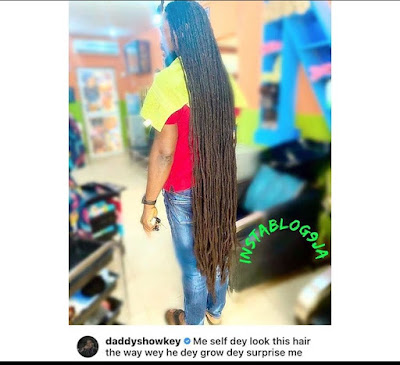African Hair Styles: Best ways to manage your hair
African hair comes in various
textures ranging from rough to silky. It can also grow beyond the buttocks,
whether silky or kinky. Take Daddy Showkey’s hair for instance. This blog post will discuss ways to manage the “thick, woolly” - according to my social studies textbook - type, which for a long time, many blacks have been ashamed of.
Historically, African women and men have been known to plait, weave, lock, shave their hair or leave it coated in ochre (a clayish mixture normally used by Ethiopian and Namibian women to protect the hair from harsh weather). The social media boom, the women’s rights movement as well as the surge in the promotion of minority or indigenous peoples' rights, have helped to foster inclusion and amplify the voices of diversity. The result is seen in African boys and girls, men and women, taking pride in defining their heritage and identity through their hair – their crowning glory.
For several years, many black and African women retouched their hair with chemicals or stretched it with hot, combing irons (below) in order to fit into society. Because grooming the typical African hair has been difficult to maintain, many opted to stretch their hair. However, stretched hair is prone to easier breakage than natural, kinky hair, and the hair products that were commonly available back then did more harm than good. Thankfully, there is a natural (African) hair revolution going on around the world. Nowadays, too, the circulation of new, alternative, and organic versions of hair products has helped a lot of women, girls, men, and boys manage their hair with ease, joy, and pride.
The modern, black or coloured woman has diverse ways she grooms and styles her hair to best suit her personality and the trends. Due to the texture of the African hair, the best way to grow and maintain it is to leave it natural and unrelaxed (not chemically stretched), in my opinion. Many hairstylists will tell you (if your hair is relaxed) that when your roots have fresh new growth, it makes the tips frizzy and break. There is no relationship, please. In fact, what hurts the hair the most is applying the chemical (the relaxer) in the first place, and secondly, applying it to previously relaxed/retouched hair. The chemical is meant for the roots only.
Although my hair is relaxed, my dominant hairstyle is braiding since I retouch it once a year to maintain a healthy thickness. I have tried many hairstyles and, in my observation, the best way to protect our hair from weather elements is through locking, plaiting (tying the hair with threads or wool to completely cover the entire length of hair) and braiding. Plaiting the hair helps cover or shield the tips from breakage or getting frizzy. Wearing wigs has worked for a lot of women too.
Below are 10 ways you can manage and protect your hair;
1. braids
2. crochet braids
3. Bantu knots
4. dreadlocks
5. faux locks (twists)
6. cornrows
7. didi (inverted cornrows)
8. wearing wigs
9. wrapping (in gels, ochre, etc), and
10. plaiting with threads or wool
On a final note, the more organically
based the products you use on your hair, the healthier and more nourished it will
be. Shea butter has worked wonders for me and it can for you too. If you need
some, don’t hesitate to reach out to venussbay@gmail.com or send a message to
@venussbay Ultimately, if you need more advice on
caring for your hair, don’t forget to seek support from an expert.
Was this post helpful? Your feedback
matters.
-----
Image credits:
1. Wikipedia
2. Daddy Showkey
3. Facetoface Africa
4. @Nnekalolo
5. Good Housekeeping
6. Blackhair hub
7. African hair network










Comments
Post a Comment